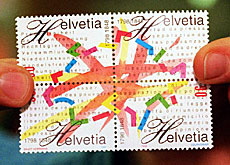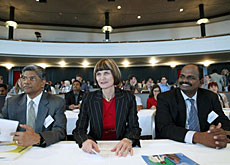Federalism offers hope for conflict resolution

Students from all corners of the globe have gathered in Fribourg to study the Swiss model of federalism and how it can be used to solve conflicts.
The Institute of Federalism also aims to teach students attending its summer course to adopt a more broad-minded, multicultural attitude.
“I come from a country, where terrible things have happened,” says Lidija Basta Fleiner, who grew up in the former Yugoslavia, and who now heads the International Research and Consulting Centre (IRCC) at the institute.
Basta Fleiner believes most conflicts have their roots in petty disputes.
“This is something I’ve experienced in Belgrade,” she says. “Here in Switzerland, it’s possible to sell compromise as a good, political solution. But that is unfortunately not the case in many other cultures.”
Basta Fleiner has been studying federalism since the early 1990s and took up the IRCC directorship in 1997. Since then, the institute has become increasingly involved in conflict negotiations, for instance in Burundi, Somalia and Sudan.
A highlight of the institute’s academic calendar is its summer course which runs for three weeks in September, and which is attended by around 40 students from over 25 nations.
“We wanted the university to be a place where we could teach people about federalism from a Swiss perspective,” explains Basta Fleiner.
“You can’t export the Swiss system, but it has some basic rules which you cannot find anywhere else, namely sensitivity [and openness] towards minority groups.”
Learning by doing
But the summer university teaches more than just theory. “We focus on trying to make students understand the points of view of the other side,” says Basta Fleiner.
However, some students say the course has also exposed flaws in the federalism system.
“When I arrived, I thought Switzerland would be a shining example that could inspire groups engaged in conflicts,” says Sri Lankan student Eranthi Premaratne.
“But when I got here, I realised that there were also tensions here between different language groups.”
But Premaratne has overcome her disappointment and has now developed a more pragmatic approach.
“I’ve learned that federalism cannot solve all problems, [though] I’m convinced that strong institutions can bind a country together,” she says, adding that Swiss federalism should continue being used as a working model for Sri Lanka.
Switzerland’s federal system was proposed as a model for a peaceful Sri Lanka in a plan brokered by Norway in February 2002.
Human will
Albert Kagabo, a town councillor from the Burundian capital, Bujumbura, also believes that federalism would be a viable solution for his country.
Burundi has been racked by a decade-long civil war that has killed around 300,000 people, pitting various rebel groups from the Hutu majority against a politically dominant Tutsi minority.
“We need to learn more about the experiences of developed and well-organised nations,” says Kagabo.
But he also believes that peace cannot just be founded on a country’s constitution or on its institutions.
“A good constitution isn’t enough – the will [for peace] mustn’t be confined to paper. It also has to take hold of people’s minds.”
swissinfo, Hansjörg Bolliger (translation: Vanessa Mock)
Some 38 students from 27 countries took part in this year’s summer course.
The curriculum includes federalism, decentralisation and good governance.
The Institute of Federalism, part of Fribourg University, was set up in 1983, and has been involved in conflict resolution negotiations in Somalia, Sudan and Burundi.

In compliance with the JTI standards
More: SWI swissinfo.ch certified by the Journalism Trust Initiative










You can find an overview of ongoing debates with our journalists here . Please join us!
If you want to start a conversation about a topic raised in this article or want to report factual errors, email us at english@swissinfo.ch.